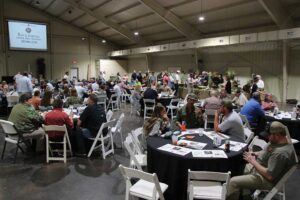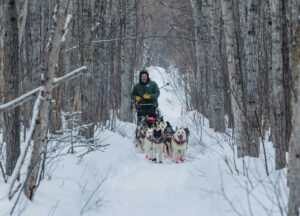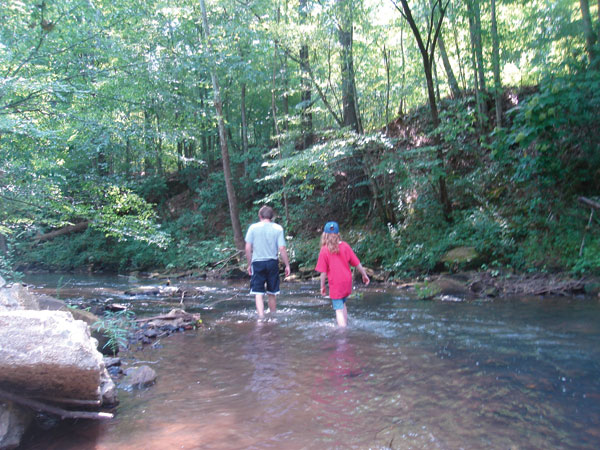
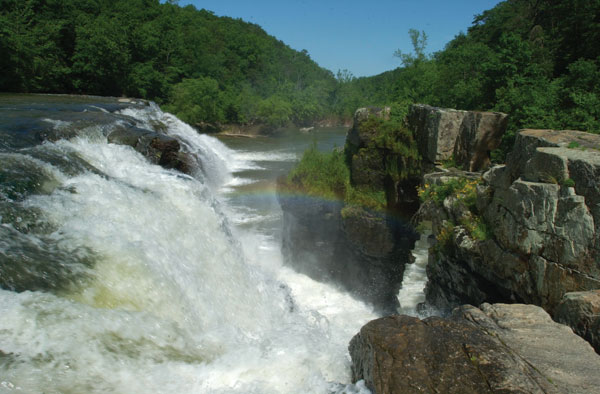
Exploring the possibility of a Big Canoe Creek Preserve
Story by Carol Pappas
Photos by Michael McKenzie
Submitted photos
For Springville’s Laura McKenzie, Big Canoe Creek is more than just a picturesque stream that meanders lazily through St. Clair County. It’s her science classroom, her family’s recreation area and an environmental wonder all rolled into one.
When she and her husband, Michael, moved to the area, she said she joked with him, “Now we can commence with raising a biologist.”
As it turns out, it wasn’t much of a stretch. “Because of our creek, so far, we have two biologists and counting,” she said. Over the years, she has used the creek to teach groups of homeschoolers as well as her family about ecology and biology.
She shares an attraction to the creek with people like Doug Morrison. He began his love of the creek through recreation but soon found an inner passion to save it, preserve it and share it for generations. Today, he is president of Friends of Big Canoe Creek, an environmental group dedicated to preserving this natural resource.
All across the state, there are people just like McKenzie and Morrison, who recognize the value of preserving Alabama treasures. In 2009, Big Canoe Creek was nominated to be a part of the Forever Wild program, which buys land all across Alabama to preserve it for the public’s enjoyment.
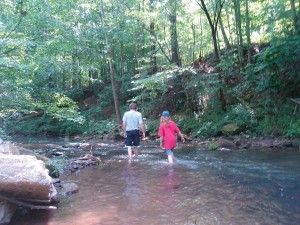 Funding has been on hold while the program awaits its fate in the Nov. 6 election. On the ballot as Amendment 1, voters across Alabama will have an opportunity to vote ‘yes’ or ‘no’ on continuing to fund Forever Wild through interest earned on natural gas royalties, capped at $15 million each year.
Funding has been on hold while the program awaits its fate in the Nov. 6 election. On the ballot as Amendment 1, voters across Alabama will have an opportunity to vote ‘yes’ or ‘no’ on continuing to fund Forever Wild through interest earned on natural gas royalties, capped at $15 million each year.
Those who question continuing it say they just aren’t sure how much longer or at what level the program should be funded.
Since its creation in 1992, the Forever Wild Land Trust has bought more than 227,000 acres of land for public use. But even so, Alabama ranks last with the smallest percentage of public conservation land in the Southeast, according to Forever Wild.
“I think Forever Wild is a great program because it provides land available to the public for recreation,” Morrison said. “Every community needs green space for an opportunity to explore, experience and absorb nature. Outdoor activities are important physically and mentally for all ages, and the Friends of Big Canoe Creek has nominated land in Springville which adjoins Big Canoe Creek, for consideration by Forever Wild.”
Morrison said the hope is for a Big Canoe Creek Nature Preserve open to the public for hiking, biking, horseback riding and scouting. As part of the plan, they want public access to the creek for canoeing, kayaking and fishing. “It could be a recreational oasis, and is a great opportunity to preserve land adjacent to a state treasure that is Big Canoe Creek.”
He’s not alone in that belief. “Big Canoe Creek is a beautiful stream, rich with unique and rare species of plant and animal life,” according to Wendy Jackson, executive director of the Alabama Freshwater Land Trust. Jackson, who also lives in St. Clair County, has been a vocal proponent of the Forever Wild program and has worked alongside countless groups to keep it going.
“The property under consideration by Forever Wild will help preserve the integrity of the creek while providing outdoor recreation activities,” she said. But more than just recreation, she pointed out, “Forever Wild properties are proven economic engines for the communities where they are located because people from across Alabama and from out of state visit them, in turn generating tourism revenue for the local community.”
Barnett Lawley, former commissioner of the Alabama Department of Conservation and Natural Resources, has worked tirelessly across the state during his tenure as commissioner and in the days since for Forever Wild.
But his roots in the creation of Forever Wild go all the way back to the beginning. The St. Clair County native was vice president of the Wildlife Federation when the bill was passed. As commissioner, he automatically became chairman of the Forever Wild board.
He shares McKenzie’s belief that the lands acquired are indeed outdoor classrooms. “It’s pristine land, and it needs to be protected” for generations to come. He points to the wetlands that are part of Forever Wild acquisitions, noting that they can teach about the natural filtration of groundwater. There are so many good things besides hunting and fishing.”
Lawley, too, talked about the economic impact. At Paint Rock River, the parking lot for public access had to be expanded twice.
In Hale County, just south of Greensboro, the national grand championship for field trial dogs is being held in September at the old state cattle ranch, which now bears the name of the man who had the vision behind it, M. Barnett Lawley Forever Wild Field Trial Area.
That’s 750 dogs, their owners, their trainers and others associated with them staying in the area for two weeks. For the Black Belt, it is a much-needed injection of outside money, Lawley said.
And natural resources like those across Alabama are economic drivers used to lure industrial prospects to the state. At Gov. Riley’s annual Turkey Hunt, 100 prospects from around the world stayed at different farms and lodges across the state. You might recognize names like Airbus and Thyssen-Krupp among the guest list. Both now call Alabama home.
They see the quality of life found here. “It’s an economic development tool using natural resources. Forever Wild adds to that program,” Lawley said.
Recreation, education, economic development, tourism — it all sounds like a winning proposition for Alabama. Add to that, the use of money to fund it from a depleting resource — natural gas — and putting it into a permanent resource — land — and Lawley reasons that it is good for the people of Alabama. The land becomes a permanent asset of the state, it doesn’t use a dime of taxpayer money, and it is a resource that can be used and enjoyed by the people from now on.
While Forever Wild is a statewide political issue, McKenzie illustrates through the comments of a mother and a teacher how all politics are indeed local. “The creek has offered a place of sanctuary, peace, fun and renewal. I would love for other parents in our area to be able to share in these benefits. That is why I’m so excited about the possibility of Forever Wild buying the property along Big Canoe Creek. Kids are much more motivated to learn when they are actively engaged in their subject,” she said. “When they value the beauty of the creek, they begin to value the science behind it.”
And when they value something, they want to protect and preserve it.
As Lawley put it, “Forever Wild is a reinvestment into the state for the people.”













